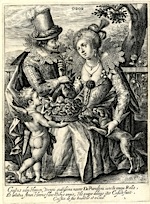- Edition: An Humorous Day's Mirth
Critical Introduction
- Introduction
- Texts of this edition
- Facsimiles
122Gentlemen
Humours plays prey hungrily on the new taste for upward mobility. Labesha is very keen to stress his gentlemanly status (TLN 808), and Rowley attends the ordinary despite his sartorial poverty, borrowing money from one of his fatherʼs retainers. The importance of outward appearances and the desire to become a ‘gentlemanʼ is also keenly addressed by Jonson in Every Man in His Humour and Every Man out of His Humour. In the latter play, Carlo Buffone explains to the would-be gentleman Sogliardo what such status demands of him: ‘First, to be an accomplished gentleman, that is, a gentleman of the time, you must give oʼer housekeeping in the country and live altogether in the city amongst gallants, where, at your first appearance, ‘twere good you turned four or five hundred acres of your best land into two or three trunks of apparelʼ (1.2.41-46). Carlo continues by stressing that Sogliardo should study social conduct and deportment, learn the popular card and dice-games of primero and passage, ‘haʼ two or three peculiar oaths to swear by that no man else swearsʼ (ll. 51-52), eat at the ordinary, ‘sit melancholy, and pick your teeth when you cannot speakʼ (ll. 60-61).
123Furthermore, ‘when you come to plays, be humorous, look with a good starched face, and ruffle your brow like a new boot; laugh at nothing but your own jests, or else as the noblemen laughʼ (ll. 61-64). The noblemen, born to their elevated status, must be observed and copied for correct conduct by the aspiring gentlemen. Much of Carloʼs advice involves joining in the activities of other gentlemen and noblemen, adopting certain behaviours, wearing the right clothes and saying the right things: in general, making the correct impression until one is accepted by current members of the club. Part of the Jonsonian joke lies in Sogliardoʼs attempts to follow this advice which predictably end in failure: frequently for those who aspire above their station, a natural taste for the genuine is lacking. Hence the comic novelty of Sogliardoʼs newly purchased coat of arms which rebels against authentic heraldry and good taste in its variety of colours and symbols. Like the behaviour Carlo advises him to adopt, the coat of arms stands out as a fabricated attempt at something to which Sogliardo has not been born. Hence the acknowledgement of his true breeding in his rough hands, which correctly identify him and put Saviolina out of her humour.
124Humours comedy often exposes the folly of characters adopting elevated behaviours. Every Man in His Humour contains Stephano, who thinks possession of a hawk, without any knowledge of what to do with it, will make him seem a gentleman. Lorenzo Seniorʼs advice to him is simply ‘learn to be wiseʼ (1.1.59), but Stephano is too proud to heed it, fancying himself in a pair of silk hose in the following scene. His desire for nice, gentlemanly things gets him into trouble when he picks up Giulianoʼs dropped cloak and decides to wear it, despite knowing to whom it rightfully belongs. After being threatened with arrest he returns it.
125 In the same play, Bobadilla adopts the role of the braggart soldier who boasts of his prowess with a sword but refuses to fight Giuliano, claiming he is afraid he will beat him. As justice, Giuliano literally beats him, prompting Bobadilla to invent the ridiculous excuse that he couldnʼt reach his sword because he was planet struck. His pretensions have him repeat the phrase ‘as I am a gentlemanʼ, as does Labesha in An Humorous Dayʼs Mirth (TLN 1169-1170, 1199). Both Bobadilla and Labesha hopelessly dote on a woman: the former reads poetry to Hesperida, who ends up betrothed to Lorenzo Junior; Labesha fawns on Martia, and is the approved choice of her father, but loses out to Dowsecer, whose return to health is prompted by the sight of his future bride.
126The concluding speech by the King in An Humorous Dayʼs Mirth has the very opposite effect to Musco being invested with Doctor Clementʼs robes and dubbed a Lord of Misrule: it represents the reclamation of power by the ruling monarch who retrieves it from his minionʼs grasp. The Kingʼs final speech smoothes over the hostility still present between Moren and his wife, stressing Lemotʼs ‘unhurtful motives of delightʼ (TLN 2000-2001), and anticipating enjoyment of the wedding celebrations that evening. It is the dramatic equivalent of using a sticking plaster to mend an open wound. Whether the characters have learnt their valuable lessons and heeded the lotteryʼs advice is matter for another day, perhaps with less mirth.
